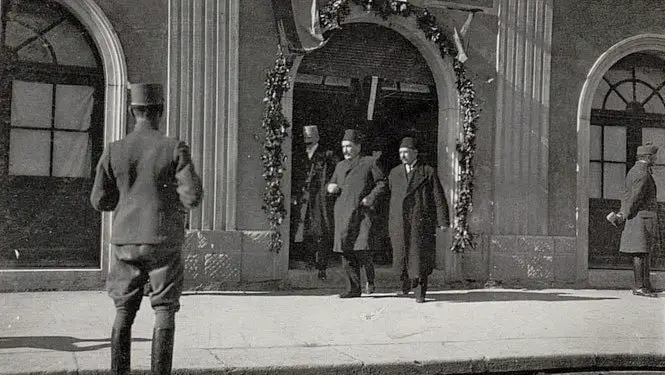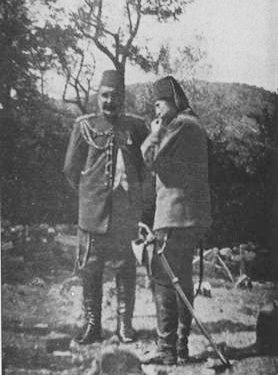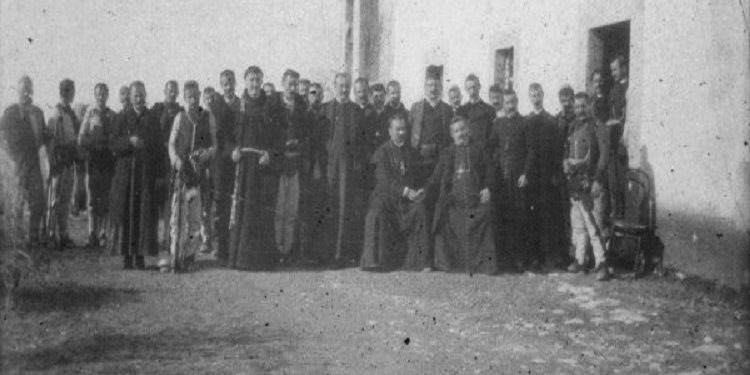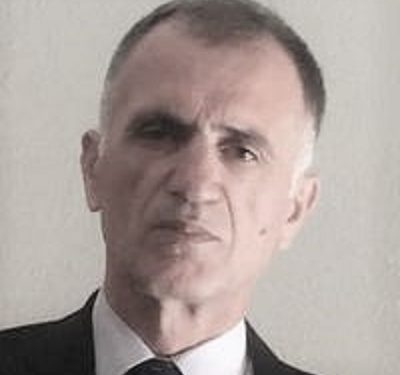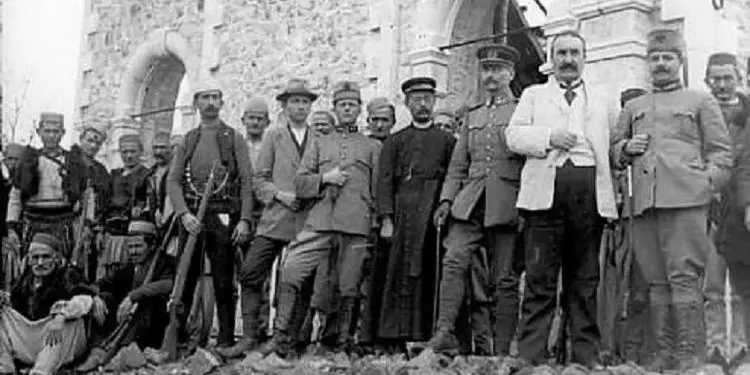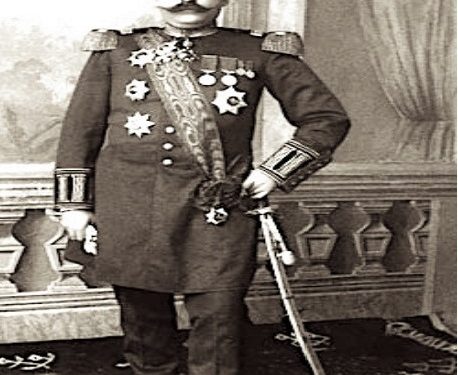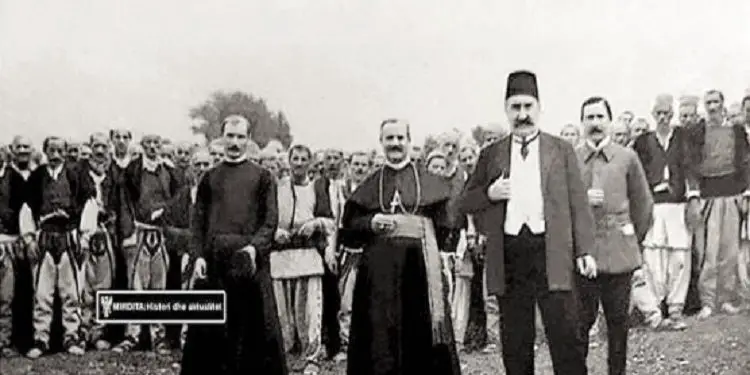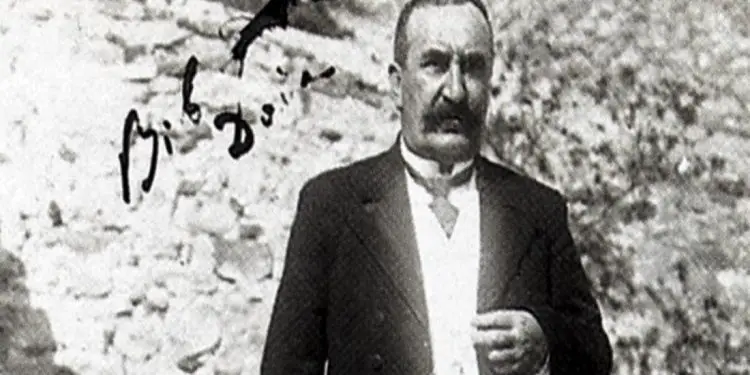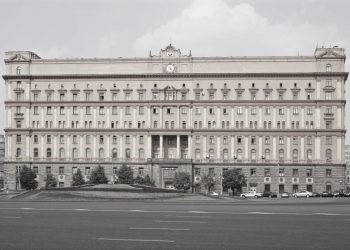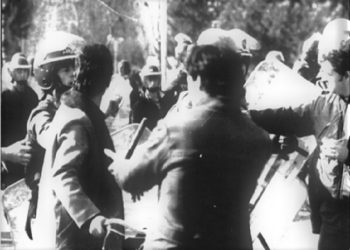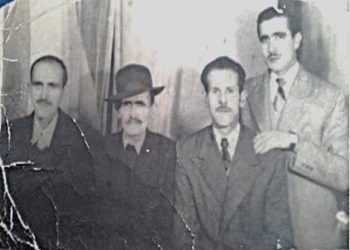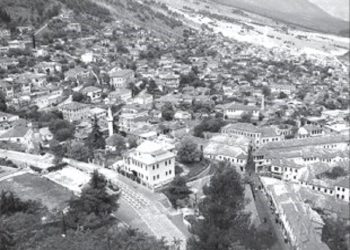By Dr. Nikol Loka
Part twenty
“PRENGA BIBE DODA, THE SHADOWS OF A CITIZENSHIP”
Memorie.al / The newest book “Prengë Bibë Doda, a phenomenon in Albanian political life”, by researcher Nikollë Loka, not only expands the scope of historical studies on Mirdita, the Door of Gjonmarkaj and the figure of the Mirdita Prince, Prengë Bibë Doda, but it is also a contribution to national historiography. The very rich archival material, the literature used or consulted, oral traditions, etc., make this book a real study treasure, giving the science of history a scientific monograph that enriches our knowledge of Mirdita, its captains, tradition, history etc. To study such an important and complex figure, as the figure of Prengë Biba Doda, is a high scientific responsibility that not everyone undertakes. Nikollë Loka, has done a great job of research and treatment by the professional researcher, giving us the portrait of the Prince and the general Mirditor, with the true contours. Dr. Loka has adhered to the end of the space and time, in which the multidimensional events and their protagonists have developed.
THE MONOGRAPH “ABOUT BIBË DODA, A PHENOMENON IN ALBANIAN POLITICAL LIFE”, A VALUABLE SCIENTIFIC STUDY THAT ENRICHS THE FUND OF OUR HISTORICAL STUDIES
(By Mr. Sc. Murat Ajvazi, March 2017, Switzerland)
In Trieste, Prenga had met the well-known Albanian politician Ismail Qemal Bey. He had come from Switzerland specifically for this purpose, as he saw Prenga as the representative of the Catholic tribes of Northern Albania. At this time, Prengë Pasha was urgently called by the leader of the Mirditors, Mark Gjoni, to go to Skopje, to exert his influence in the talks that were taking place between the Albanians and the Ottoman authorities, after the occupation of the city by the Albanians. Ismail Qemali was also called, but for the same reason, like him, he did not participate. The Prince of Mirdita had sent his deputy, Marka Gjoni, to Skopje. If the further development of events in Albania prevented his trip to Skopje at that moment, Prenga intended to go there in the future. (402)
Prenga had been active through his two closest aides, his secretary, Ibrahim Kumanova, and his son-in-law, Doctor Sadedini, who could move freely. When the French consul in Shkodër had passed through Trieste, he had met Ibrahim Efendiu, in the report he made about that meeting he wrote: “… I hoped that my advice would be fruitful and I am sorry to notice that have not been respected…! Since the departure of Prengë Bibë Doda from Shkodra, forgetting the reserve imposed by his nationality and the rank of General in the Ottoman army, he has made many trips to Italy, thus providing the Ottoman authorities with sufficient reasons to accuse him of helps the Mirditas for the benefit of the Italians. Ibrahim Efendi’s stay in Podgorica, his subsequent presence in Orosh and Kallmet, will only intensify the accusation, to which it will be difficult to present, in the right case, valid counterarguments”.
The French consul forgets in this case, that the order for the appearance of Prenga in Istanbul was still in force. Being forced to leave for reasons of his safety, Prenga, however, feels the responsibility of the function he held; therefore he used every opportunity to stay in touch with the developments in Albania and Mirdita. Prenga’s motives for the need to maintain ties with Mirdita are also confirmed by the French consul: “Informed about the role that his cousin is now playing and afraid that he will take his place, this Prince of Mirdita has thought since sending his secretary to Mirdita would prove to his compatriots that he is always interested in them and would put his authority under threat. This is a personal conclusion, which is well supported by the character of Prengë Pasha”. (403)
Regarding the trip of Prenga Pasha’s secretary, the same consul sends a detailed report to Paris, as he had followed it closely: “With my notification no. 96, I had the honor to signal to you, Your Excellency, the presence in Montenegro of Ibrahim Efendi, secretary of Prengë Pasha. I told him that his presence among the insurgents would certainly arouse the suspicion of the authorities, and this would have serious consequences for him and his master. My predictions are coming true. Several notices posted in the city give Ibrahim Efendi a deadline of eight days to appear before the authorities and, in case of absence; he will be punished by a military court. This punishment, taking into account the propaganda for insurrection that they wear on him, as well as the state of curfew, can only is the death penalty.
On the other hand, Prengë Pasha, received in Trieste, where he is now, the order of the Minister of War, to go immediately to Constantinople, where he will surely have to give an account for his illegal absence from the Command of the Rediffs Division of Shkodra, for his frequent trips to Italy, for his last stay in Vienna, where he went under the pretext that he would assist in the celebrations of the Eucharistic Congress. I don’t know if he will obey this call, but I hope he gives up this hostile attitude, which nothing justifies. His mother is rightly worried by these measures and is afraid that there will be consequences. This situation is aggravated even more by the escape of Doctor Sadedini, a military doctor, who is said to be engaged to a certain Marta, who lives with the Princess. This officer was an ordinary man of the house table and his clandestine escape to Trieste will certainly be interpreted, not only against him, but also against Preng Pasha, attributing this action to his instigations”. (404)
On September 8, Prengë Bibi Doda had left for Vienna. (405) on this occasion, through the Ministry of Foreign Affairs of Austria-Hungary, he requested that this announcement be made to his mother: “The Minister of War, Nezim Pasha, has invited Prenga to go to Constantinople. He begs his mother’s advice, considering the impression he will make on the elders, should he respond positively to this invitation or not? The answer of Margjela Bib Doda, to be telegraphed. Berchtold (406)
Apparently, the answer of the Princess was negative, since from Vienna Prenga, instead of Istanbul, had gone to Paris. According to an announcement from the Legation of Serbia in Cetina, “one of the purposes of Biba Doda’s trip to Paris is to meet with the Turkish ambassador, to defend himself from the accusations of Vali of Shkodra”. (407) French Consul Krajevski, on this occasion, informs the Ministry of Foreign Affairs: “Despite the embassy’s reassuring telegram that I sent him, despite the mature advice I gave him, Prengë Pasha did not want to give up his decision to going to Paris, before going to Istanbul, to present the information expected of him.
He feels threatened by the raid on his house in Kallmet and hopes to have insurance guarantees to preserve the natural state of things. Yes, as if the complaints that can be made against him are not enough, he adds another more serious one, which this time would compromise him. Bibë Doda told me that Valiu himself advised her to travel to Paris. I find it hard to believe this, but only if this advice hides the desire to finally compromise it with the Ottoman Government. I explained this to him, but I failed to convince him.
I hope that his indecisive thinking will make him change his route and go straight to Istanbul, without going through Paris…! He set out yesterday in an Austrian vessel, accompanied by many people and his own officer, who was attached to him by the Committee, doubtless to superintend his conduct and to spy on him. (408)
Prengë Bibë Doda, left the country because he did not have to obey the invitation of the High Gate, to go to Istanbul. In this period in Albania, violent political events took place, but most importantly, he, with his positions abroad that had been under the strict observation of the diplomats of the countries concerned, had taken positions against Austro-Hungarian interests and for this purpose, it was not foreseen that he would perform high-level political functions in the new Albanian state. After a full 14 months of stay in Europe, Prengë Pasha, on August 6, 1913, with the Italian torpedo boat “Iscari”, arrived at the port of Shengjin. (409)
For the entire period from June 1912 to August 1913, for a full 14 months, Prengë Bibë Doda stayed abroad, first for security reasons and then for many other reasons, related to defining the role his in the future political developments in Albania, or with the commitments for the economic problems of the family.
The departure abroad, together with the lack of desire on the part of Vienna for Prenga to be an important protagonist in the new Albanian state, are factors that explain his absence in the historic Assembly for the declaration of National Independence and in the first state-forming processes. Because of Bibë Doda, he remained in conflicting relations with Porta, even though there were two-way efforts to ease relations. Unlike other Albanian politicians, for reasons that did not depend entirely on him, he could not give up the function of the traditional Head of Mirdita. Even if the government of Prenga over the twelve bajraks was accepted, again Mirdita would raise the head for other privileges of self-government, which contradicted the governing program of the Young Turks, which means that the conflict between Mirdita and the High Gate was unavoidable.
Shades of a statesman
In the period 1908-1912, the chief captain of Mirdita acted as part of the National Movement, being obliged to participate in the governing structures and played a mediating role between the Mirditas and the Ottoman officials of the Shkodra Province. Prenga acted in difficult situations and had to build and break alliances depending on the development of events. He acted behind the scenes, that’s why for many valuable historical events, he is not mentioned rightly and a careful examination of the facts is needed to get to his contribution. The leader of the Mirditas, according to the Kanun that was applied in Mirdita, the leader of the movement (nothing could be done without his permission), Marka Gjoni, led on his behalf, while the military commander was Prengë Marka Prenga, the Bajraktari of Oroshi.
In the conditions when he was not allowed to exercise the function of the Head of Mirdita, Prenga connected with all those who could help his cause even a little, in the patriotic circles of Arbëre and Shkodra intellectuals. When he was not given a role in the preparations for the declaration of Independence, he frequented the political and diplomatic circles of various countries, some with a hostile attitude towards the Albanian cause. As a politician, Prenga threw ideas and proposals, which he then calmly analyzed. Following Prenga’s political activity, we notice a lack of consistency between his ideas and actions. As a politician, he was somewhat hasty in throwing out ideas and proposals, while as a statesman, he was cautious in his actions. However, Prengë Biba Doda also has his shadows, which testify to the complexity of the situations in which he lived and acted, as well as the difficult relationship he had with the Albanian political environment.
The leader of the day was not a participant in the two major events of our national history. Did you miss these events, or did you prefer not to attend? “Hardly a participant, you don’t get married” – says Mirditasi. Apparently, in both cases, a number of factors acted outside of his will, which left the Captain out of the political course of events, which he had to participate in. On the eve of the establishment of the League of Prizren, Prenga was initially forbidden to move freely and stayed only in Shkodër, while after leading the Mirdita uprising, until May 1880, he was not pardoned, and six months later, in December of that year, was exiled to Turkey. But if he was not a delegate in the Assembly hall of the League, he became a distinguished military commander in its battles.
Prengë Bibë Doda had a long cooperation with the Montenegrins, regardless of their attitudes towards the Albanian issue. Mirdita herself had only the fighting forces, but lacked everything else to mount an uprising. In that situation, the Head of Mirdita turned to all the factors that could help him. The Austro-Hungarian ambassador in Cetina, Giesi, wrote to his superiors in Vienna, regarding the attitude of Montenegro towards the organization of the Albanian uprising: “The King inadvertently confirmed to me that the day before yesterday, he had spoken in Rjeka with a powerful representative of Prengë Bibë Doda and with the heads of Puka and Shala, who had told him how things stand. According to their words, the Mirditas have decided to rise up, while Bibë Doda, who supposedly supports the government, plays a double role. We are waiting for the arrival of several thousand “Maliher” rifles, that is, Austro-Hungarian weapons. (410)
But Austria-Hungary still supported the status quo and the Austro-Hungarian Consul in Shkodër, Zambaur, told the emissaries of Prenga: “We know that you now have money, but those who will suppress the uprising, we will we make available much more”. (411)
Prenga entered into relations with officials of several states that had competing interests in Albania and promised them all. He connects with the Austro-Hungarians, Italians, Montenegrins, etc., and even makes the round trip, from Montenegro to Italy, to Austria-Hungary and vice versa, being closely followed on his travels, not only by diplomats of these countries, but also from officials and diplomats of other interested countries.
During Bibë Doda’s stay in Trieste, the city police had informed the superior authorities: “Prengë Pashë Bibë Doda, one of the Albanian leaders, about whom my report of August 22, 1912, No. 140/8, returned yesterday again from Italy to Trieste. He had traveled on private matters, as far as Venice and Milan.
He claims that there he received the invitation of the Italian government to go to Rome and that, during the rest of his stay in Italy; he was then its guest. As Bibdoda, with whom I have been friends for many years, told me yesterday, the Italian government is now quite interested in making the Christian tribes of Northern Albania its own. I could not understand from his words, what position he wants to take against these intentions of the Italian government. The only thing that is certain is that the confidence shown in Italy towards him has made him extremely Italophile. What these aspirations were, Bibdoda did not want to show them directly, but indirectly, they could be extracted from the program, for which, in his opinion, Albanians should now fight.
This program is the project elaborated in 1880, by the Commission of Eastern Rumelia, in relation to Northern Albania, and accepted by all the Great European Powers, with the exception of Russia. That program aims at the creation of Christian vicariates, a program that Bibdoda spoke about only after he returned from Rome. Therefore, the assumption is very likely that for this effort, he has now been invited to Rome. (412)
But more than this, the other fact that Bibdoda has returned to Trieste, in order to meet here with the envoy of the King of Montenegro, with the son of the well-known Albanian agitator, Sokol Bacit, Nikolle, deserves consideration. Bacin. The latter brought Bibdoda the invitation of King Nicholas to go to Cetina. According to Nikollë Baci’s data, “The King will propose to Bibë Dodë Pasha that he help him conquer Shkodra and the province up to Drin, with the commitment of the Catholic Albanian tribes and, in return, Montenegro will help him to realize his aspirations, in relation to the Catholic tribes”. (413)
For the Serbian government, “Prengë Bibë Doda, is in the Turkish service head and shoulders. His task is not easy, because many people present him as a traitor. But, since the people of Mirdita have an extraordinary respect for him from the saint, being a descendant of the princely family descended from God, with which the best tribal memories are connected, he manages to face all the difficulties”. (414)
While Captain Gjonmarkaj was in Montenegro, an anti-Montenegro movement had started in Mirdita. “As it is said among the Albanians who live here, Bibë Doda’s trip was related to a movement that allegedly took place near mid-day and is directed both against staying under Turkish rule and against further progress of the Montenegrins, having as goal, and the independence of their province”. (415)
That movement must be the fruit of the patriotic propaganda made by the clergy. Pasha of Mirdita, did not become the leader of the movement for independence, like Hasan Prishtina, or any other prominent historical personality. Due to the lack of active participation in the uprising of Central Albania, of the two pashalars, Esad Pasha and Prengë Pasha, that uprising did not have such a wide participation and the desired results were not achieved.
As long as Prenga was excluded from participating in government, he developed his idea of cantonization of the country, taking into account his influence in Mirdi and other Catholic territories. Prenga had also made this propaganda to the English and French members of the International Commission. According to him, “The future Albania should be divided into three provinces, completely autonomous, each with its own governor, connected between them through the person of the Prince. At the head of South Albania, he thinks to be Myfit Bey, of Central Albania, Hamit Bey and of North Albania, Prengë Pasha.
The idea of cantonization was addressed years ago by Abbot Doçi, even then on behalf of the Prince of Mirdita. Doçi held the same attitude even at the beginning of the Albanian state. The similarity in outlook between Doda and Doci had also impressed foreigners. Rear Admiral Barry announced that “Prengë Pasha and Monsignor Doçi had given this problem a completely identical treatment”. (416)
In another variant of cantonization, Prenga reduced the number of self-governing Albanian units from three to two, for the direction of which, in one of them he considers himself. According to Prengë Bibi Doda; “It is necessary that in the event of the creation of an autonomous Albania, an administrative division into two parts of the country must be foreseen. Thus, the region of Catholic mountain tribes, estimated by him to approximately 300,000 people, form one administrative unit, while that of Muslim and Orthodox Albanians, who together make up approximately 300,000 people, form the other unit. Memorie.al
The next issue follows
- Ramiz Abdyli, Albanian National Movement 1911-1912, Book 2, Institute of History Prishtina, 2004, p.158
- Telegram from the police directorate in Trieste, addressed to the governor of Trieste, on the activity of I. Qemali, etc., Tel. No. 666, Trieste, August 1912, Albania in Austro-Hungarian Documents 1912, vol. II, p. 105-106
- Report of the Consul of France in Shkodër, for His Excellency Mr. Poincare, Prime Minister and Minister of Foreign Affairs, regarding the movement of Prengë Biba Doda through Italy, No. 96, Shkodër of Albania, on August 29, 1912, French Documents for Albania and the Albanians in 1912, volume II, Muhamet Shatri, Toena publications, Tirana, 2012, p.85-87
- Consul of France in Shkodër, His Excellency, Mr. R. Puankare, Chairman of the Council of Ministers, Minister of Foreign Affairs of the Republic No. 127, Shkodër, 23 September 1912, French Documents for Albania and Albanians in 1912, Institute of History Prishtina, selected, prepared and edited by Muhamet Shatri, Prishtina, 2004, p.284
- Notice of the Austro-Hungarian Police Directorate in Trieste on the movements of Prenga Biba Doda and his connections with Italy and Montenegro, No. 9177, Trieste, on 8 September 1912, in Albania in Austro-Hungarian Documents 1912, vol. V, Albanological Studies Center, Institute of History, prepared by Beqir Meta, Muharrem Dezhgiu, Fatmira Musaj, Albanological publications, 2012, p. 164-165
- Count Berchtold’s order to the Austro-Hungarian consul general in Shkodër, Zambaur, to ask Prengë Bibë Doda’s mother if she saw fit for him to pay a visit to Istanbul at the invitation of the Ottoman government, No. 71, Vienna, on September 21, 1912, in Albania in Austro-Hungarian documents 1912, vol. V, Center Studies, Albanological Institute of History, prepared by Beqir Meta, Muharrem Dezhgiu, Fatmira Musaj, Albanological publications, 2012, p. 345
- Legation of the Kingdom of Serbia in Cetina, Prime Minister and Foreign Minister of the Kingdom of Serbia, Milovan Milovanovic in Belgrade, Cetina June 3, 1912, Albanian Uprising of 1912 in Serbian documents, Albanian Institute Prishtina 2008, p.258
- French documents about Albania and Albanians in 1912, selected, prepared and edited by Muhamet Shatri, publication of the Center for Albanian Studies, Toena, Tirana 2012, p.85-87
- HHStA-PA-VJ-23-11-1291. No. 218. Kastalnuovo-Shkodër, dated August 7, 1913. Digital telegram of Mr. Zambaur sent to Bertold, Vienna
- Report of the Minister Plenipotentiary Giesi Cetina, addressed to the superiors in Vienna, regarding the attitude of Montenegro towards the organization of the uprising of the Albanians and their emigration to this country, No. 3247, No. 8/ Top secret, Cetina, on January 25, 1912, Albania in the Austro-Hungarian documents (1912), Volume I, prepared and edited by Beqir Meta and Sokol Gjermeni, Albanological Publications, 2014, Center for Albanological Studies, Institute of History, p. 132-133
- Report of the Minister Plenipotentiary Giesi Cetina, addressed to the superiors in Vienna, regarding the attitude of Montenegro towards the organization of the uprising of the Albanians and their emigration to this country, No. 3247, No. 8/ Top secret, Cetina, on January 25, 1912, Albania in Austro-Hungarian documents (1912), Volume I, prepared and edited by Beqir Meta and Sokol Gjermeni, Albanological Publications, 2014, Center for Albanological Studies, Institute of History, p. 132-133
- Notice of the Austro-Hungarian Police Directorate in Trieste on the movements of Prenga Biba Doda and his connections with Italy and Montenegro, No. 9177, Trieste, on 8 September 1912, in Albania in Austro-Hungarian Documents 1912, vol. II, Albanological Studies Center, Institute of History, prepared by Beqir Meta, Muharrem Dezhgiu, Fatmira Musaj, Albanological publications, 2012, p. 164-165
- Notice of the Austro-Hungarian Police Directorate in Trieste on the movements of Prenga Biba Doda and his connections with Italy and Montenegro, No. 9177, Trieste, on 8 September 1912, in Albania in Austro-Hungarian Documents 1912, vol. V, Albanological Studies Center, Institute of History, prepared by Beqir Meta, Muharrem Dezhgiu, Fatmira Musaj, Albanological publications, 2012, p. 164-165
- ACG, MID. F-163, Legation of the Kingdom of Serbia in Montenegro” to the Prime Minister and Minister of Foreign Affairs of the Kingdom of Serbia, Milovan Millovanović in Belgrade, Cetina, 25 November 1912, The Albanian Uprising of 1912 in Serbian Documents, prepared by Zekeria Cana , Prishtina Albanological Institute 2002008, p.90
- The diplomatic representative of Austria-Hungary in Bari informs the ambassador in Rome and Count Berchtold in Vienna about Prengë Bibë Doda’s movements and his intention to go to Albania Tel. No. 19/pol, Bari, on November 13, 1912, Albania in Austro-Hungarian Documents (1912) Volume VI, prepared by: Marenglen Verli, Ledia Dushku, Albanological Publications, 2012, Center for Albanological Studies, Institute of History, Tirana, p.177- 178
- HHStA-PA-Vj. 23-15-1596, Castelnuovo-Shkodër August 28, 1913




